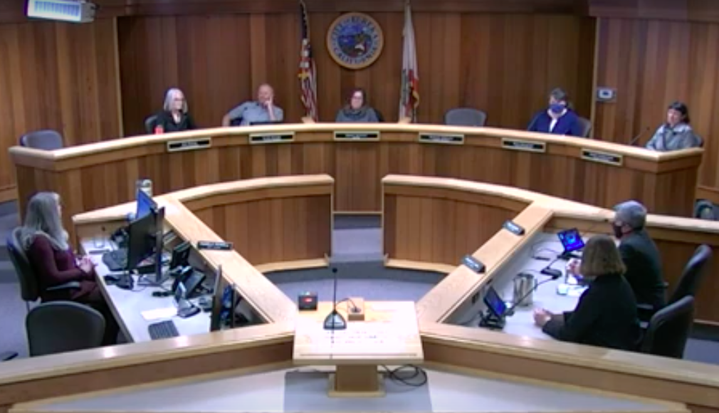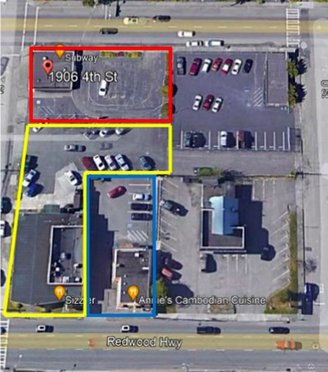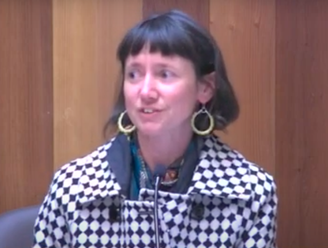Screenshot of Tuesday’s meeting. Councilmember Natalie Arroyo attended via Zoom.
###
Should Eureka ban new drive-thrus? Should it depend on what kind of drive-thru is up for consideration, or whether or not it is a locally owned business? If not ban them entirely, should drive-thrus be restricted to certain areas of the City? These are the questions the Eureka City Council pondered while exploring drive-thru options during its regular meeting on Tuesday night.
The discussion item was brought forth as a future agenda item during the council’s March 1 meeting by Councilmember Leslie Castellano just days after the Outpost reported on a development proposal to demolish Annie’s Cambodian Cuisine – located on 101 North (Fifth Street) between U and T Streets in Eureka – to make way for a drive-thru restaurant. The project referral also included plans to tear down a now-closed Subway Sandwiches at 1906 Fourth Street and the former Sizzler next to Annie’s at 1905 Fifth Street.
Castellano did not mention these sites in particular when she suggested the agenda item but noted, “There’s a number of drive-thru restaurants along the 101 corridor in Eureka and I’m interested in exploring the idea of limiting the expansion of drive-thru restaurants in Eureka and perhaps options or choices around that.”
During Tuesday’s meeting, City Principal Planner Kristen Goetz said there are 31 drive-thrus within Eureka’s city limits, 15 of which are food drive-thrus. “There are a lot of different kinds of drive-thrus here in Eureka,” she said. “We have drive-thru banks and ATMs. We have drive-thru coffee shops, pharmacies, car washes and drive-thru restaurants. In some jurisdictions [there are] drive-thru cleaners, liquor stores, even drive-thru wedding chapels.”
Eleven of the 15 food drive-thrus are “formula businesses,” which are “substantially identical to some number of other businesses in a geographic area” and are characterized by standardized service, menus, uniforms and an exterior design of the structure, similar to a “chain restaurant.”
There are also four drive-thrus in the works, including a food drive-thru where Annie’s Cambodian currently sits, a food drive-thru at Target that is awaiting a coastal development permit from the California Coastal Commission and two proposed Starbucks drive-thrus, one at the existing site of the Pine Motel on Broadway and another at the aforementioned Subway.
Eureka would certainly not be the first city to restrict drive-thrus. The City of Arcata only allows drive-thru restaurants in Valley West and, in 2002, adopted an ordinance to limit the number of formula restaurants in the City. Goetz noted that drive-thrus in Fort Bragg are conditionally permitted in the City’s central business district and only allowed at the rear of a building. In Sebastopol, drive-thrus are prohibited unless they’re in existing use.
“Reasons used [to ban drive-thrus] in other jurisdictions include, but are not limited to, reduced air pollution from idling vehicles, reduced litter and noise pollution, improved walkability in commercial areas [and] protection of small local businesses,” Goetz said, adding that there is evidence to suggest a reduction in fast food drive-thrus promotes healthier communities.
On the other hand, drive-thrus can provide services for people with limited mobility, including people who are disabled and the elderly. Drive-thrus were also critical during the pandemic when limited contact was preferred and before restaurants had implemented curbside pickups. During this same period, Goetz said seven food drive-thrus generated over $263,000 in sales tax revue for the general fund.
“There are a number of items on your menu that you could ask staff to research and return with a recommendation for appropriate action,” she said. “…We could consider maintaining the status quo and doing nothing. We could look at disallowing all new drive-thrus or maybe disallowing only a certain type. …We could consider restricting all drive-thrus to certain zones, or restricting food or beverage serving drive-thrus to certain zones.”
The council could choose to restrict the total number of drive-thrus within Eureka’s city limits, restrict proximity to other drive-thrus, or require all drive-thrus to be conditionally permitted.
Councilmember Natalie Arroyo asked whether the council had the power to change the outcome of a drive-thru that had already gone through the permitting process but had yet to be built. “We’re not talking about current applicants here. We’re talking about future applicants, right?”
“It is less than likely that we would be able to stop somebody who’s in the process, provided that their application has been deemed to complete,” Goetz said. “The four that I mentioned to you this evening have been completed.”
Similarly, Castellano asked if it would be possible to prevent any of the four aforementioned projects from moving forward.
“Target has already been approved by the City, it’s just waiting for a coastal development permit for permission,” Goetz said. “The drive-thrus at T Street are going to the planning commission at their May meeting. And the drive-thru and restaurant on Broadway [are] going to design review next week.”
Mayor Susan Seaman noted that the planning commission’s role in the approval process is to ensure the project follows the City’s guidelines. “They don’t get to really make a decision about whether they want it or not.”
Councilmembers Scott Bauer and Katie Moulton expressed interest in restricting drive-thrus in Old Town and Henderson Center but were not necessarily in favor of a citywide ban.
“I would not be in favor of restricting drive-thrus on the 101 corridor,” Moulton said. “Eureka straddles a river of money and anything we can do to snag sales tax out of all the cars that go through every day, I’m generally in favor of that. I wouldn’t want to restrict drive-thrus or most development on the corridor.”
Councilmember Kim Bergel suggested any future drive-thrus be limited to the north and south ends of Eureka along the 101 corridor.
Castellano underscored that she has “little or no interest in drive-thrus” and asserted that there “are more than enough drive-thrus to meet any tourist needs.”
Arroyo acknowledged that the discussion was “partly in reaction to certain developments that are already in progress” but said it wouldn’t be fair to move the goalpost in the middle of a project that abides by current City standards.
“I had a lot of the same concerns that folks have already mentioned,” she said. “Wanting to balance the need to obtain tax revenue from passing motorists, as well as wanting to reduce idling, wanting to support local businesses and all of the things we just talked about. I think more could be accomplished by a cap on formula businesses and figuring out where the footprint of that is and could be.”
Castellano pushed back against the notion that the City would generate more sales tax revenue by allowing more drive-thru restaurants. “I don’t think we have an adequate understanding of how that affects other businesses. …I really think making a decision saying that we’re going to bring more tax revenue in the City of Eureka based on this little bit of information is a bad idea.”
Surprisingly, there were no members of the public who wished to offer public comment during the meeting.
City attorney Autumn Luna reminded the council that they did not have to vote on the item immediately and said staff would bring back additional recommendations based on the council’s conversation.
City Manager Miles Slattery suggested the council hold a workshop to come up with more specific suggestions for the council.
Mayor Seaman agreed and emphasized the need for more community engagement on the subject. “The fact that nobody’s here is surprising because this is something that I think a lot of people care about,” she said.



CLICK TO MANAGE